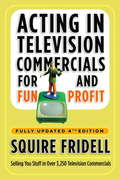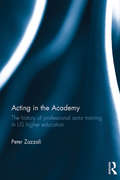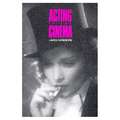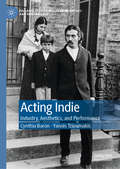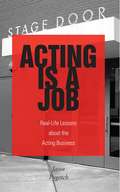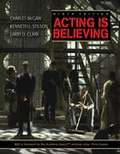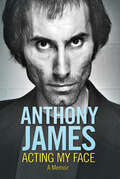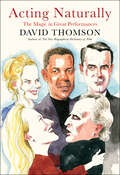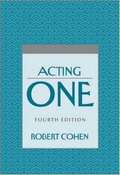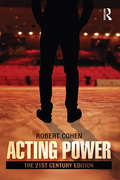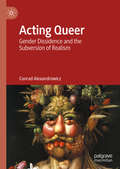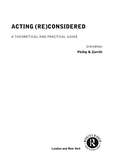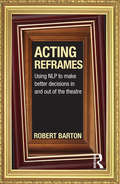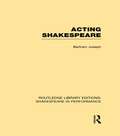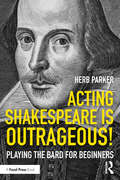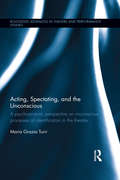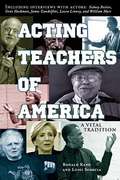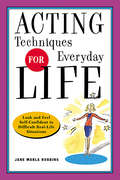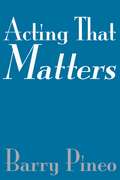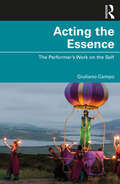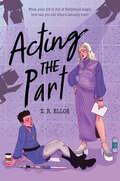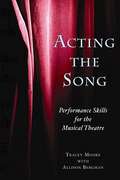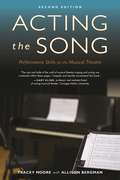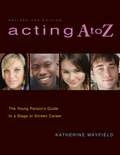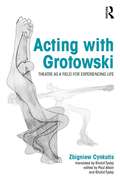- Table View
- List View
Acting in Television Commercials for Fun and Profit: Fully Updated 4th Edition
by Squire FridellThe Ultimate Guide to Commercial Success Acting in television commercials is a highly competitive business, but it can also be very lucrative. Whether you’re looking for your first break or want to take your acting career to the next level, Squire Fridell will give you the insider’s edge. Arguably the king of TV commercials, Fridell distills four decades of experience in this comprehensive, humorously written guide that has been indispensable to aspiring TV commercial actors since the first edition hit the shelves in 1980. This fully updated fourth edition gives the lowdown on how online and digital technologies have changed the industry and tells you everything you need to know about: • Getting a terrific headshot • Writing a winning résumé • Finding (and keeping) the perfect agent • Honing the skills that every serious commercial actor should have • Auditioning well and getting the job • Using the best online services for posting your headshot, résumé, and reel You’ll learn how to launch your commercial acting career and–more important–how to sustain it and be successful.
Acting in the Academy: The History of Professional Actor Training in US Higher Education
by Peter ZazzaliThere are over 150 BFA and MFA acting programs in the US today, nearly all of which claim to prepare students for theatre careers. Peter Zazzali contends that the curricula of these courses represent an ethos that is as outdated as it is limited, given today’s shrinking job market for stage actors. Acting in the Academy traces the history of actor training in universities to make the case for a move beyond standard courses in voice and speech, movement, or performance, to develop an entrepreneurial model that motivates and encourages students to create their own employment opportunities. This book answers questions such as: How has the League of Professional Theatre Training Programs shaped actor training in the US? How have training programmes and the acting profession developed in relation to one another? What impact have these developments had on American acting as an art form? Acting in the Academy calls for a reconceptualization of actor training the US, and looks to newly empower students of performance with a fresh, original perspective on their professional development.
Acting in the Cinema
by James NaremoreJames Naremore focuses on the work of film acting, showing what players contribute to movies. Ranging from the earliest short subjects of Charles Chaplin to the contemporary features of Robert DeNiro, he develops a useful means of analyzing performance in the age of mechanical reproduction.
Acting Indie: Industry, Aesthetics, and Performance (Palgrave Studies in Screen Industries and Performance)
by Cynthia Baron Yannis TzioumakisThis book illustrates the many ways that actors contribute to American independent cinema. Analyzing industrial developments, it examines the impact of actors as writers, directors, and producers, and as stars able to attract investment and bring visibility to small-scale productions. Exploring cultural-aesthetic factors, the book identifies the various traditions that shape narrative designs, casting choices, and performance styles. The book offers a genealogy of industrial and aesthetic practices that connects independent filmmaking in the studio era and the 1960s and 1970s to American independent cinema in its independent, indie, indiewood, and late-indiewood forms. Chapters on actors’ involvement in the evolution of American independent cinema as a sector alternate with chapters that show how traditions such as naturalism, modernism, postmodernism, and Third Cinema influence films and performances.
Acting Is a Job: Real Life Lessons about the Acting Business
by Jason PugatchHow to cope with the realities of life as an actor-if you don't laugh, you'll cry In-depth interviews with actors, agents, casting directors. In this hip, warts-and-all look at acting, author Jason Pugatch shares his insights as a working "day player" to give an unvarnished look at theater, film, and television: how to be "discovered," what to expect from training programs, the grunt work of starting a career, how to keep going despite constant rejection, and much more. Packed with myth-shattering anecdotes and told in an intriguing personal tone, Acting Is a Job is the backstage guide that every aspiring actor must read.
Acting Is Believing
by Larry D. Clark Kenneth L. Stilson Charles McgawIn this text, McGaw (Art Institute of Chicago School of Drama, deceased), Stilson (theater and dance, Southeast Missouri State U.) and Clark (dean emeritus, College of Arts and Sciences, U. of Missouri, Columbia) bring the traditional methods of Stanislavski in line with more contemporary schools, such as the Sanford Meisner approach.
Acting My Face: A Memoir (Hollywood Legends Series)
by Estate of JamesActor Anthony James has played killers, psychopaths, and other twisted characters throughout his Hollywood career. In the summer of 1967, James made his motion picture debut as the murderer in the Academy Award-winning Best Picture, In the Heat of the Night. His role in the 1992 Academy Award-winning Best Picture, Unforgiven, culminated a unique, twenty-eight-year career. Behind his menacing and memorable face, however, is a thoughtful, gentle man, one who muses deeply on the nature of art and creativity and on the family ties that have sustained him. James's Acting My Face renders Hollywood through the eyes and experience of an established character actor. James appeared on screen with such legendary stars as Clint Eastwood, Bette Davis, Gene Hackman, and Sidney Poitier, and in such classic television shows as Gunsmoke, The Big Valley, Starsky and Hutch, Charlie's Angels, and The A-Team. Yet, it is his mother's heroic story that captures his imagination. In an odyssey which in 1940 took her and her newly wedded husband from Greece to a small southern town in America where she bore her only child, James's mother suffered the early death of her husband when James was only eight years old. In the blink of an eye, she went from grand hostess of her husband's lavish parties to hotel maid. But like the lioness she was, she fought with great ferocity and outrageous will in her relentless devotion to James's future. And so it was, that on an August morning in 1960, eighteen-year-old James and his mother took a train from South Carolina three thousand miles to Hollywood, California, to realize his dream of an acting career. They possessed only two hundred dollars, their courage, and an astonishing degree of naiveté. After his retirement in 1994, James and his mother moved to Arlington, Massachusetts, where he concentrated on his painting and poetry. His mother died in 2008 at the age of ninety-four, still a lioness protecting her beloved son. Acting My Face is an unusual memoir, one that explores the true nature of a working life in Hollywood and how aspirations and personal devotion are forged into a career.
Acting Naturally: The Magic in Great Performances
by David ThomsonFrom the celebrated film critic and author of The New Biographical Dictionary of Film, a fascinating look at some of the cinema&’s finest actors and how they approach their craft"Open to any page and you&’ll become enthralled by the...tales of forgotten film lore, childhood memories, sexy gossip.&”—Philip Kaufman, directorMeryl Streep, Marlon Brando, Anthony Hopkins, Carey Mulligan. When we watch these remarkable actors in a performance, we see only Sophie, Stanley Kowalski, Hannibal Lecter, or Cassie from Promising Young Woman. How are they able to transform our world in this way? How and why do they do what they do?In Acting Naturally, David Thomson sheds light on the actors who have shaped the film industry. He shrewdly analyzes these stars—among them, James Dean, Nicole Kidman, Denzel Washington, Louise Brooks, Riz Ahmed, Sir Laurence Olivier, Viola Davis, and Jean Seberg—revealing how a sly smile, an extra-long pause, even a small gesture of the hand can draw in an audience. And he takes us behind the scenes to examine casting and all the other moments leading up to &“Action!&”Through intimate anecdote, humor, and the insight born of a lifetime watching and analyzing film, Thomson explores the real reasons why we go to the movies and looks at how they influence our lives. This book is not only necessary reading for an insider&’s view of the industry but also a surprising investigation of the relationship between acting and living.
Acting One (4th edition)
by Robert CohenUsed to teach beginning acting on more campuses than any other text, Acting One contains twenty-eight lessons based on experiential exercises. The text covers basic skills such as talking, listening, tactical interplay, physicalizing, building scenes, and making good choices.
Acting Power: The 21st Century Edition
by Robert Cohen‘Robert Cohen’s book, Acting Power, follows the tradition of his other book, Acting One, and has been the veritable bible for acting teachers for the last quarter century.’ – David Krasner, Emerson College ‘This book, above all else, is an attempt to explore the qualities of acting power.... to suggest to you, the actor, an approach toward not merely good acting but powerful acting. Great actors display the power to frighten – and the power to seduce – and can shift between the one and the other like a violinist can her notes.’ – From the Preface The first edition of Acting Power was a groundbreaking work of acting theory which applied sociological and psychological principles to actor training. The book went on to influence a generation of theatre and performance studies students and academics, and was translated into five languages. This carefully revised 21st Century Edition (re)considers, in the context of today’s field: questions such as ‘should actors act from the inside or the outside?’ and ‘should the actor live the role or present the role?’; contemporary research into communication theory, cybernetics, and cognitive science; brilliantly illuminating and witty exercises for solo study and classroom use, and a through-line of useful references to classic plays; penetrating observations about the actor’s art by more than 75 distinguished professional actors and directors. Cohen’s elegant and rigorous updates emphasise the continuing relevance of his uniquely integrated and life-affirming approach to this field. The new edition draws on his extraordinarily rich career as teacher, scholar, director, translator and dramaturg. It is a recipe for thrilling theatre in any genre.
Acting Queer: Gender Dissidence and the Subversion of Realism
by Conrad AlexandrowiczThis book is situated at the intersection of queer/gender studies and theories of acting pedagogy and performance. It explores the social and cultural matrix in which matters of gender are negotiated, including that of post-secondary theatre and drama education. It identifies the predicament of gender dissident actors who must contend with the widespread enforcement of realist paradigms within the academy, and proposes a re-imagining of the way drama/theatre/performance are practised in order to serve more fairly and effectively the needs of queer actors in training. This is located within a larger project of critique in reference to the art form as a whole. The book stimulates discussion among practitioners and scholars on matters concerning various kinds of diversity: of gender expression, of approaches to the teaching of acting, and to the way the art form may be imagined and executed in the early years of the 21st Century, in particular in the face of the climate crisis. But it is also an aid to practitioners who are seeking new theoretical and practical approaches to dealing with gender diversity in acting pedagogy.
Acting (Re)Considered (Re)Considered: A Theoretical and Practical Guide
by Phillip B. ZarrilliActing (Re)Considered is an exceptionally wide-ranging collection of theories on acting, ideas about body and training, and statements about the actor in performance. This second edition includes five new essays and has been fully revised and updated, with discussions by or about major figures who have shaped theories and practices of acting and performance from the late nineteenth century to the present.The essays - by directors, historians, actor trainers and actors - bridge the gap between theories and practices of acting, and between East and West. No other book provides such a wealth of primary and secondary sources, bibliographic material, and diversity of approaches. It includes discussions of such key topics as:* how we think and talk about acting* acting and emotion* the actor's psychophysical process* the body and training* the actor in performance* non-Western and cross-cultural paradigms of the body, training and acting.Acting (Re)Considered is vital reading for all those interested in performance.
Acting Reframes: Using NLP to Make Better Decisions In and Out of the Theatre
by Robert BartonActing Reframes presents theatre and film practitioners with a methodology for using Neuro-Linguistic Programming (NLP) as a tool to aid their practice. Author Robert Barton uses the NLP approach to illustrate a range of innovative methods to help actors and directors, including: • reducing performance anxiety • enabling clearer communication • intensifying character analysis • stimulating imaginative rehearsal choices. The author also shows how NLP can used alongside other basic training systems to improve approaches to rehearsal and performance. The book shows the use of NLP to the reader in a playful, creative and easily accessible style that is structured to enable solo study as well as group work. The text offers a range of engaging exercises and extensive analysis of language patterns used in performance. It is a source for enhancing communication between all theatre practitioners in training, productions, and daily life outside the theatre. Acting Reframes gives actors a richly rewarding approach to help them develop all aspects of their craft.
Acting Shakespeare (Routledge Library Editions: Shakespeare in Performance)
by Bertram Leon JosephHow did the actors for whom Shakespeare wrote his plays make his characters come to life, how did they convey his words? Can modern directors, actors, and even library readers of Shakespeare learn from them? Creating character and making the Elizabethan playwright’s poetry compelling for the audience is a problem which has seldom been resolved in modern times. This book demonstrates the hard course a modern actor must follow to make real and truthful the words he speaks, and the action and emotion underlying them. With examples and simple exercises, this book helps with the preparation for the great task – providing the actor with a combination that unlocks the Bard's English. Starting with how theatrical speech was understood in Renaissance England, it looks at figures of speech, the powers of persuasion, and the passion and rhythm inherent in the language.
Acting Shakespeare is Outrageous!: Playing the Bard for Beginners
by Herb ParkerPerforming the work of William Shakespeare can be daunting to new actors. Author Herb Parker posits that his work is played easier if actors think of the plays as happening out of outrageous situations, and remember just how non-realistic and presentational Shakespeare's plays were meant to be performed. The plays are driven by language and the spoken word, and the themes and plots are absolutely out of the ordinary and fantastic - the very definition of outrageous. With exercises, improvisations, and coaching points, Acting Shakespeare is Outrageous! helps actors use the words Shakespeare wrote as a tool to perform him, and to create exciting and moving performances.
Acting, Spectating and the Unconscious: A psychoanalytic perspective on unconscious mechanisms of identification in spectating and acting in the theatre. (Routledge Advances in Theatre & Performance Studies)
by Maria Grazia TurriFrom Aristotle’s theory of tragic katharsis onwards, theorists of the theatre have long engaged with the question of what spectatorship entails. This question has, directly or indirectly, often been extended to the investigation of acting. Acting, Spectating, and the Unconscious approaches the unconscious aspects of spectatorship and acting afresh. Interweaving psychoanalytic descriptions of processes such as transference, unconscious phantasy, and alpha-function with an in-depth survey of theories of spectating and acting from thinkers such as Brecht, Diderot, Rousseau and Plato, Maria Grazia Turri offers a significant insight into the emotions inherent in both the art of the actor, and the spectator’s experience. A compelling investigation of the unconscious communication between spectators and actors, this volume is a must-read for students and scholars fascinated by theatre spectatorship.
Acting Teachers of America: A Vital Tradition
by Ronald RandFifty of America's most influential acting teachers (including directors and actors who also teach) explain their philosophy and techniques. Each teacher interview is immediately followed by another with a former or current student describing his or her impact.
Acting Techniques for Everyday Life: Look and Feel Self-Confident in Difficult, Real-Life Situations
by Jane Marla RobbinsMost people can name at least one situation?a business presentation, a job interview, a cocktail party, or a blind date?in which they felt uncomfortable, nervous, or simply self-conscious. Jane Marla Robbins, a successful stage and film actress and teacher for almost forty years, found that she could use the same acting techniques she employed to look and feel confident on stage and screen to make herself feel more comfortable in ?real-lifeOCO situations. In clear and accessible language, Robbins describes acting techniques that actors having been using for centuries and explains?using real-life examples and easy-to-follow exercises?how each can be used by ordinary people to make difficult everyday situations easier to handle. Acting Techniques for Everyday Life will teach readers how to create a sense of well-being and self-confidence at will, giving them the tools they need to be as confident, strong, witty, authentic, relaxed, and happy as they want to be in any given situation. "
Acting That Matters
by Barry PineoAn invaluable resource for anyone wanting his or her acting to matter, this groundbreaking guide defies most modern acting methods by rejecting emotion as an acting tool. With the advice in this book, actors will see beyond the prevailing "objective-obstacle" approach and look primarily to the text the playwright provides. Actors learn how to dissect a text for key words and phrases, as well as how to score a script, find proper tempo and rhythm, modulate volume and intensity, use theatrical stillness effectively, find beat actions, listen to their acting partners, and much more. Expert tips are also provided for auditioning, cold reading, and taking direction.
Acting the Essence: The Performer's Work on the Self
by Giuliano CampoActing the Essence examines the theory, practice, and history of the art of the performer from the perspective of its inner nature as work on oneself, within, around, and beyond the pedagogy of the actor. Ref lecting primarily on the legacy of Jerzy Grotowski, this book is composed of a series of ref lections on the Stanislavskian lineage of practitioners and related authors, in an attempt to revive awareness of the original path traced by the Russian master and to refine certain ambiguities in contemporary training. In a new media age of image and sound, accompanied by a proliferation of new technologies and means to communicate, emphasised by the COVID-19 crisis, a classic question comes to be asked of us again: What is the essence and the principal objective of the work of the performer? Is performing art still necessary? While proposing a theoretical advancement of the discipline and an historical overview of the relevant practices, this book provides tools for a better understanding of the traditional function of the performer’s practice as work on the self, for its ecological renaissance through a conscient use of trance, attention, and altered states of consciousness. This book offers insight for students in drama, theatre, and performance courses studying acting and performance at university.
Acting the Part
by Z.R. EllorThis delightfully tropey teen romance perfect for fans of Ashley Poston and Lyla Lee follows a queer teen actor navigating their gender identity—while pretending to date their co-star. Queer actor Lily Ashton has found fame playing lesbian warrior Morgantha on the hit TV show Galaxy Spark. Lily knows how little representation queer girls have, so when the showrunners reveal that Morgantha’s on-screen love interest, Alietta, is going to be killed off, Lily orchestrates an elaborate fake-dating scheme with the standoffish actress who plays her, to generate press and ensure a happy ending for the #Morganetta ship.But while playing a doting girlfriend on- and off-screen, Lily struggles with whether a word like “girl” applies to them at all.Lily’s always been good at playing a part. But are they ready to share their real self, even if it means throwing everything they’ve fought for away?
Acting the Song: Performance Skills for the Musical Theatre
by Tracey Moore Allison BergmanActing the Song offers a contemporary, integrated approach to singing in musicals that results in better-trained, smarter performers who can use song to add drama and dimension to their roles. Directors, teachers of musical theater, and students--including actors, singers, or dancers--will find time-tested advice, exercises and worksheets for all skill levels. This book guides readers through musical theater elements, classroom workshops, and the world of professional auditions and performances. Chapters cover vocal and physical warm-ups, body movement, finding subtext, creating a character, song structure, interpreting text of music and lyrics, risks and spontaneity, memorization, collaboration, keeping a performance fresh, and much more. Both teachers and students will appreciate the sections for beginning, intermediate, and advanced performers. Everyone involved in musical theater, from new students to working professionals, will benefit from this rich resource.
Acting the Song: Performance Skills for the Musical Theatre
by Tracey Moore Allison BergmanActing the Song offers a contemporary, integrated approach to singing in musicals that results in better-trained, smarter performers everyone wants to work with. In this new, thoroughly updated edition of the paperback, directors and teachers of musical theater will find guidance in developing and leading musical theater elements, classroom workshops, and the world of professional auditions and performances. A companion ebook specifically for students-including actors, singers, or dancers-contains time-tested advice, exercises, and worksheets for all skill levels, with links to additional resources online. Subjects for both versions cover:Singing and acting terminologyUse of microphones, recording devices, and other technologyVocal and physical warm-ups, movements, and gesturesCreating a characterFinding subtext, interpreting music and lyrics, and song structureCollaborating with other actorsKeeping a performance fresh and newUsing social media and online audition sitesTeachers and students alike will appreciate the sections for beginning, intermediate, and advanced performers. Covering all changes to the industry, education, music styles, and audition protocols, everyone involved in musical theater, from new students to working professionals, will benefit from this rich resource.Allworth Press, an imprint of Skyhorse Publishing, publishes a broad range of books on the visual and performing arts, with emphasis on the business of art. Our titles cover subjects such as graphic design, theater, branding, fine art, photography, interior design, writing, acting, film, how to start careers, business and legal forms, business practices, and more. While we don't aspire to publish a New York Times bestseller or a national bestseller, we are deeply committed to quality books that help creative professionals succeed and thrive. We often publish in areas overlooked by other publishers and welcome the author whose expertise can help our audience of readers.
Acting A to Z: The Young Person's Guide to a Stage or Screen Career - Revised 2nd Edition
by Katherine MayfieldLots of kids want to be actors. Thousands of them. Millions of them. The ones who are serious need a copy of Acting A to Z. Industry insider Katherine Mayfield explains exactly what it’s like to be an actor, including what kind of training the young person will need, comparisons of the different types of acting, how to find work, how to prepare for an audition, and what to expect during rehearsal. There’s also tons of helpful information on unions, casting directors, headshots, resumes, and much more. Reassuring without being patronizing, Acting A to Z is the one book that every aspiring child actor needs.
Acting with Grotowski: Theatre as a Field for Experiencing Life
by Zbigniew Cynkutis‘Zbigniew Cynkutis’ writings constitute invaluable testimony of his work with Jerzy Grotowski during the ‘theatre of productions’ phase and beyond. Cynkutis’ insights elucidate aspects of the Laboratory Theatre’s praxis and provide a unique perspective on the questions most often asked about Grotowski. Authored by one of the Laboratory Theatre’s most accomplished actors, this book draws on long-term theatre research and deep knowledge of the craft of acting to offer practical advice indispensable to the professional and aspiring actor alike. The volume offers the English-speaking reader an unprecedented richness of primary source material, which sheds new light on the practical work of one of the most influential theatre directors of the 20th century. Cynkutis’ voice is sincere and direct, and will continue to inspire new generations of theatre practitioners.’ – Dominika Laster, Yale University Acting with Grotowski: Theatre as a Field for Experiencing Life explores the actor-director dynamic through the experience of Zbigniew Cynkutis, one of Polish director Jerzy Grotowski’s foremost collaborators. Cynkutis’s work as an actor, combined with his later work as a director and theatre manager, gave him a visionary overview based on precise embodied understanding. Cynkutis’s writings yield numerous insights into the commitment needed to make innovative, challenging theatre. A central component of Acting with Grotowski is his distinctive approach to training: ‘Conversations with the Body’ includes a range of techniques and approaches to warming up, rehearsing and creating work from a physical starting point, beautifully illustrated by Bill Ireland. The book comprises reflections and practical suggestions on a range of subjects – theatre and culture, improvisation, ethics, group dynamics, and Cynkutis’s vision for the Wrocław Second Studio. It contains visual and textual materials from Cynkutis’s own private archive, such as diary entries and letters. Acting with Grotowski demonstrates the thin line that separates life and art when an artist works with extreme commitment in testing political and social conditions.
